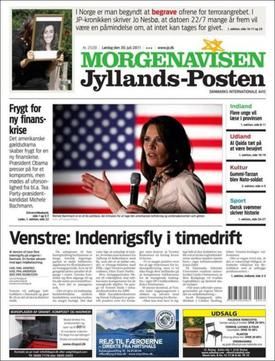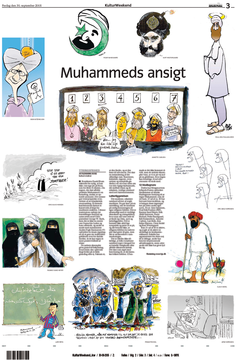Related Research Articles

Morgenavisen Jyllands-Posten, commonly shortened to Jyllands-Posten or JP, is a Danish daily broadsheet newspaper. It is based in Aarhus C, Jutland, and with a weekday circulation of approximately 120,000 copies.

Flemming Rose is a Danish journalist, author and Senior Fellow at the Cato Institute. He previously served as foreign affairs editor at the Danish newspaper Jyllands-Posten. As culture editor of the same newspaper, he was principally responsible for the September 2005 publication of the cartoons that initiated the Jyllands-Posten Muhammad cartoons controversy early the next year, and since then he has been an international advocate of the freedom of speech.
The Jyllands-Posten Muhammad cartoons were first published by Jyllands-Posten in late September 2005; approximately two weeks later, nearly 3,500 people demonstrated peacefully in Copenhagen. In November, several European newspapers re-published the images, triggering more protests.
Carsten Juste is a Danish journalist and former editor-in-chief of Jyllands-Posten, a Danish large-circulation newspaper.

Kurt Westergaard was a Danish cartoonist. In 2005 he drew a cartoon of the Islamic prophet Muhammad, wearing a bomb in his turban as a part of the Jyllands-Posten Muhammad cartoons, which triggered several assassinations and murders committed by Muslim extremists around the world, diplomatic conflicts, and state-organized riots and attacks on Western embassies with several dead in Muslim countries. After the drawing of the cartoon, Westergaard received numerous death threats and was a target of assassination attempts. As a result, he was under constant police protection.
This page collects opinions, other than those of governments or inter-governmental organizations, on the Jyllands-Posten Muhammad cartoons controversy. For an overview, and details on the controversy please see the main page.
Ahmed Akkari is a Danish political activist who became known for his involvement in the Jyllands-Posten Muhammad cartoons controversy. Widely called an "Imam" in the media, he himself denied being one. He was a co-author of the Akkari-Laban dossier, which played a major role in the Jyllands-Posten Muhammad cartoons controversy by bringing the issue to the attention of influential decision-makers in the Middle East. In 2013 he distanced himself from his former position and in June 2020 became one of the founders of the political party New Centre-Left.

The Jyllands-Posten Muhammad cartoons controversy began after the Danish newspaper Jyllands-Posten published 12 editorial cartoons on 30 September 2005, most of which depicted Muhammad, a principal figure of the religion of Islam. The newspaper announced that this was an attempt to contribute to the debate about criticism of Islam and self-censorship. Muslim groups in Denmark complained, and the issue eventually led to protests around the world, including violence and riots in some Muslim countries.
The Vollsmose terrorists were three men convicted of attempted terrorism in Denmark in 2007–2008. Nine men were initially arrested by Danish police in the Vollsmose neighbourhood of Odense on 5 September 2006, but most were later released without charges, including a police mole who played a role in the investigation and trial. Four men were charged with attempted terrorism, three of whom were convicted. According to Danish police, the group had been under investigation for quite a while.

The 2008 Danish embassy bombing was an attack on the Danish embassy in Islamabad, Pakistan on 2 June 2008. The suspected suicide car bombing in the parking lot of the embassy took place at around 12:10 pm (UTC+5), killing at least six and wounding many more. The Danish national security intelligence agency PET concluded that al-Qaeda was behind the attack. Al-Qaeda claimed responsibility for the attack on 5 June 2008. The attack was confirmed to be an answer to the reprinting of Danish newspaper Jyllands-Posten's Muhammed cartoons in February 2006, as well as the presence of Danish troops in Afghanistan.
The International Free Press Society (IFPS), founded on 1 January 2009, is a creation of the Danish Free Press Society. The stated purpose of IFPS "is to defend freedom of expression wherever and by whomever it is threatened".
Munir Awad is a Lebanon-born citizen of Sweden who was convicted of plotting a terrorist attack in Denmark. Munir Awad, and his fiancée were arrested in Kenya in 2007 when Ethiopian forces invaded Somalia and foreigners were detained as suspected terrorists. On December 29, 2010 Awad was arrested in Denmark and in 2012 was found guilty of plotting a terrorist attack in revenge for Jyllands-Posten's publication of Muhammad cartoons.
Captain Tahawwur Hussain Rana is a Pakistani former military doctor who served in the Pakistan Army. He moved to Canada after gaining citizenship and became an immigration service businessman.
Events from the year 2010 in Denmark.
The 2010 Copenhagen terror plot was a terrorist plot against Jyllands-Posten, the publisher of the controversial cartoons of Muhammad in 2005.
Terrorism in Norway includes a list of major terrorist incidents where organized groups and lone wolves have tried carrying out attacks. In recent years, there has been a rise mostly of Islamic extremism and far-right violence and various groups have been suspected of terrorism plans.
Terrorism in Denmark refers to terrorist attacks carried out in Denmark or by people connected to Denmark. Like other countries Denmark increased its focus on defending against terrorist attacks after the September 11 attacks in New York in 2001. The September 11 attacks led to strengthened laws in a number of areas. 31 May 2002 the parliament of Denmark approved anti-terror legislation with the aim of preventing terrorism in Denmark and internationally. The new legislation aligned with the definitions of terrorism which were in use by the European Union and the United Nations.
Mikael Davud is a Chinese-Norwegian Al-Qaeda operative convicted for conspiracy to commit terror against the Danish newspaper Jyllands-Posten, along with co-conspirator Shawan Bujak. Arrested in 2010, Davud was sentenced to eight years imprisonment in 2013.
On 24 July 2014, a suspected imminent terror attack by Islamic extremists targeting Norway was disclosed by Norwegian authorities. The suspected plot prompted a public terror alert announcement and unprecedented short-term security measures being introduced in Norway in late July.
On 17 December 2018, the bodies of Louisa Vesterager Jespersen, a 24-year-old Danish woman, and Maren Ueland, a 28-year-old Norwegian woman, were found decapitated in the foothills of Mount Toubkal near to the village of Imlil in the Atlas Mountains of Morocco.
References
- 1 2 "Police: Terror Plot Targeted Danish Paper for Muhammad Cartoons". Associated Press. 2015-03-27. Retrieved 2020-11-03.
- 1 2 3 4 5 "Utpekt som terrorsjef". Verdens Gang (in Norwegian). 29 August 2010. Archived from the original on 2016-01-30. Retrieved 2016-01-20.
- ↑ "Norway Announces Three Arrests in Terrorist Plot". The New York Times. 8 July 2010.
- 1 2 3 4 5 6 7 8 9 "Terrordømte funnet skyldige i lagmannsretten" (in Norwegian). NRK. 20 September 2012. Archived from the original on 2016-02-05. Retrieved 2016-01-20.
- 1 2 3 4 5 6 7 Lia, Brynjar; Nesser, Petter (1 August 2010). "Lessons Learned from the July 2010 Norwegian Terrorist Plot". Combating Terrorism Center. Archived from the original on 2016-01-31. Retrieved 2016-01-25.
{{cite journal}}: Cite journal requires|journal=(help) - ↑ Ocean, Kristen Boon; Aziz Z. Huq; Douglas C. Lovelace (2012). United States Approaches to Global Security Challenges. Oxford University Press. p. 565. ISBN 9780199915903. Archived from the original on 2016-01-31. Retrieved 2016-01-25.
- ↑ "- Slik planla de terror på norsk jord". Dagbladet (in Norwegian). 13 July 2010. Archived from the original on 2016-02-03. Retrieved 2016-01-25.
- ↑ "Omstridt moské i Sarpsborg" (in Norwegian). NRK. 12 July 2010. Archived from the original on 2016-02-05. Retrieved 2016-01-25.
- 1 2 "Norway jails two for Danish newspaper terror plot". BBC News. 2012-01-30. Retrieved 2020-11-03.
- ↑ "- We were planning to blow up Jyllands-Posten". www.vg.no (in Norwegian Bokmål). Retrieved 2020-11-03.
- ↑ "Davud dømt til sju års fengsel" (in Norwegian). NRK. 30 January 2012. Archived from the original on 2016-02-05. Retrieved 2016-01-20.
- ↑ "Police: Terror Plot Targeted Danish Paper for Muhammad Cartoons". Associated Press. 2015-03-27. Retrieved 2020-11-05.
- ↑ "Norway jails two for Danish newspaper terror plot". BBC News. 2012-01-30. Retrieved 2020-11-05.
- 1 2 "Retten: Davud planla terror sammen med al-Qaida". Aftenposten (in Norwegian). 30 January 2010. Archived from the original on 2016-02-14. Retrieved 2016-01-20.
- ↑ "Nederlag for terrorplanleggere i Høyesterett" (in Norwegian). NRK. 31 May 2013. Archived from the original on 2016-01-31. Retrieved 2016-01-20.